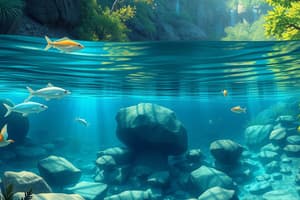Podcast
Questions and Answers
What is the primary role of water in biogeochemical cycles?
What is the primary role of water in biogeochemical cycles?
- To create solid structures in ecosystems
- To act as a universal solvent for various substances (correct)
- To facilitate the growth of aquatic plants exclusively
- To act as a significant energy source for organisms
Which of the following is NOT a component of the hydrologic cycle?
Which of the following is NOT a component of the hydrologic cycle?
- Precipitation
- Photosynthesis (correct)
- Evaporation
- Condensation
How does water act as a greenhouse gas in the atmosphere?
How does water act as a greenhouse gas in the atmosphere?
- It reflects sunlight back into space
- It absorbs and traps heat energy (correct)
- It facilitates cloud formation
- It decreases atmospheric pressure
Why does ice float on water?
Why does ice float on water?
What does metabolic water refer to?
What does metabolic water refer to?
What percentage of water in the biosphere exists as liquid?
What percentage of water in the biosphere exists as liquid?
What is the process called during which water vapor condenses into clouds?
What is the process called during which water vapor condenses into clouds?
Which of the following best describes the interrelationship of energy and matter?
Which of the following best describes the interrelationship of energy and matter?
What role does water play during winter months for aquatic life?
What role does water play during winter months for aquatic life?
What property of water allows it to store large amounts of heat energy?
What property of water allows it to store large amounts of heat energy?
What happens to the density of water when it freezes?
What happens to the density of water when it freezes?
What is the main difference between adhesion and cohesion in water?
What is the main difference between adhesion and cohesion in water?
How do organisms primarily gain water from their environment?
How do organisms primarily gain water from their environment?
What is the effect of drought on plant stomata?
What is the effect of drought on plant stomata?
What percentage of the human body is made up of water?
What percentage of the human body is made up of water?
What is a consequence of increased global temperatures on ecosystems?
What is a consequence of increased global temperatures on ecosystems?
Flashcards
Water's Role in Biogeochemical Cycles
Water's Role in Biogeochemical Cycles
Water moves through living (biotic) and non-living (abiotic) parts of Earth, impacting other matter cycles.
Hydrologic Cycle
Hydrologic Cycle
The continuous process of water moving as a liquid, gas, and solid between Earth's surface and atmosphere.
Evaporation/Transpiration
Evaporation/Transpiration
Liquid water changing into water vapor (gas) from bodies of water or plant leaves.
Condensation
Condensation
Signup and view all the flashcards
Precipitation
Precipitation
Signup and view all the flashcards
Runoff
Runoff
Signup and view all the flashcards
Universal Solvent
Universal Solvent
Signup and view all the flashcards
Hydrogen Bonding
Hydrogen Bonding
Signup and view all the flashcards
Water's high heat capacity
Water's high heat capacity
Signup and view all the flashcards
Water's high boiling point
Water's high boiling point
Signup and view all the flashcards
Water's density changes with temperature
Water's density changes with temperature
Signup and view all the flashcards
Cohesion in water
Cohesion in water
Signup and view all the flashcards
Adhesion in water
Adhesion in water
Signup and view all the flashcards
Water as a solvent
Water as a solvent
Signup and view all the flashcards
Water's role in regulating temperature
Water's role in regulating temperature
Signup and view all the flashcards
Water balance in organisms
Water balance in organisms
Signup and view all the flashcards
Study Notes
A3 - The Role of Water in Matter Cycles
- Water plays a crucial role in biogeochemical cycles due to its chemical and physical properties.
- Water's properties, including its ability to form hydrogen bonds and being a universal solvent, influence homeostasis and impact ecosystems.
- Earth's water supply is limited within the biosphere. This water comes from various sources, including surface water sources, snow, ice, oceans or cellular respiration (metabolic water).
Water in the Biosphere
- The biosphere is a closed system with a limited amount of water.
- Water and other chemical nutrients cycle through biotic (living) and abiotic (non-living) components of the biosphere via biogeochemical cycles.
The Hydrologic Cycle
-
The hydrologic cycle involves the continuous movement of water between the Earth's surface and the atmosphere.
-
This cycle involves four key processes: evaporation (or transpiration), condensation, precipitation, and runoff.
-
The cycle connects ecosystems, and any changes in one part of it will affect other parts of the cycle.
-
Water exists in all three states (solid, liquid, and gas) in the hydrologic cycle.
-
Ninety-seven percent of water in the biosphere is liquid water due to its high boiling point.
-
Water's ability to absorb and retain heat energy moderates global temperatures.
-
The transfer of heat throughout the biosphere is facilitated by water's capacity to absorb large amounts of heat energy, which is distributed by wind and ocean currents.
Water as a Universal Solvent
- Water's polar nature allows it to dissolve many substances, making it a universal solvent.
- This property enables the transport of various dissolved substances within living organisms, which is referred to as biogeochemical cycling.
Hydrogen Bonding
- Hydrogen bonding and forces of repulsion between oxygen atoms create open spaces in ice, resulting in a lower density than liquid water.
- This unique property causes ice to float, preventing lakes and ponds from freezing completely.
- Hydrogen bonding is also responsible for water's high heat capacity, enabling it to absorb and store large amounts of heat energy without significant temperature changes. This moderates temperatures over a larger range, supporting a variety of climates
Water Stores Heat
- Water's high specific heat capacity means it requires a lot of energy to change its temperature.
- This property is significant for moderating the temperature of large bodies of water and within organisms.
Density
- Water's density changes based on temperature. Cold water has a lower density than warm water; warm water has a higher density.
- This difference in density plays a vital role in aquatic environments.
Cohesion
- Water molecules' attraction to each other creates cohesion, leading to surface tension.
- Cohesion is crucial for various biological processes, such as the ability of some insects to walk on water.
Adhesion
- Water's attraction to other substances, called adhesion, creates an upward force countering gravity.
- Adhesion and cohesion work together to move water up plants' tissues via transpiration.
Water and Organisms
- Human bodies are composed primarily of water.
- Organisms gain water through eating, drinking, absorption, and cellular respiration. They lose water through breathing, sweating, and waste.
- Maintaining a balance of water absorption, retention, and loss is crucial for metabolic activities.
Water and the Greenhouse Effect
- Water's presence in the atmosphere acts as a greenhouse gas, trapping heat.
- Changes in water availability (e.g., droughts) can significantly impact ecosystems and human activities, such as agriculture.
- Limited water availability can lead to plant stress through strategies like closing stomata to conserve water and impacting photosynthesis.
- Human activities that increase greenhouse gasses further impact water cycles such as evaporation.
Studying That Suits You
Use AI to generate personalized quizzes and flashcards to suit your learning preferences.




